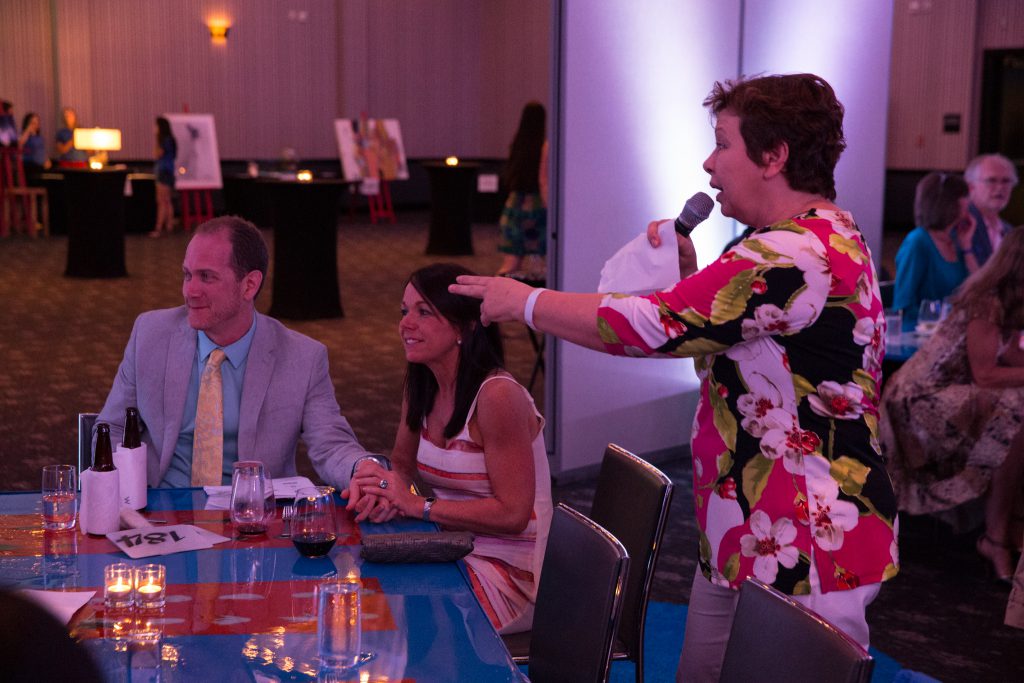The History of Auctions
While women auctioneers may be more ubiquitous these days, auctions have long been an important part of American culture, ever since the Pilgrims brought the practice back from Britain. The first recorded American auction took place in 1662, as the early settlers found they could sell everything from livestock, to tools, to tobacco for quick, reliable cash. Auctions were often the fastest and most efficient way to get rid of products people no longer needed, especially things that could rot or spoil.

However, the history of auctioneering goes back further than that — as far back as ancient Greece when the first auctions were held as a way to sell off recently acquired war spoils. It wasn’t until the 17th century that people saw the beginning of trade auctions, which more closely resemble the modern-day auctions we’re familiar with: a fast-talking, supercharged live event that can quickly sell goods of all types, from real estate to industrial equipment to antiquities and fine art (and everything in between).
By and large, the auction industry has been made up of family-run businesses. Auctioneering requires a vast amount of knowledge that covers a range of subjects, not limited to extensive specialized information about all kinds of items, including provenance and appraisal value. It was easy to pass down this knowledge through the generations, thus keeping it in the family.
Auctioneers, too, must know the ins and outs of the legalities surrounding the industry, which can be complicated as laws vary from state to state and evolve over time.
Perhaps most importantly, but hardest to teach, an auctioneer needs that elusive certain something: the ability to read and work a room. Auctioneers not only need to tune into the crowd’s energy, but they also need to be able to manipulate that energy to end up with the highest price. After all, the goal is always to bring in the most money possible.
Some might call this special ability of an auctioneer a gift. In some cases, perhaps it’s a woman’s intuition.
Breaking the Glass Ceiling of the Auction Industry
As in most industries, the auction industry was historically dominated by men. However in the mid-twentieth century, the industry started to become more open as women decided they too could bring value. As women were breaking the glass ceiling in nearly every job market out there, it wasn’t long until they discovered the exciting world of auctioneering. Considering the early auctions’ hottest commodities were daughters who were auctioned off as wives, you could say women auctioneers have come a long way.
These days, they’re on the other side of the gavel.

In 1950, the stage was set for a long line of women auctioneers when the first woman sold a rocking chair at an auction. That woman was Emma Bailey from Vermont, who was one of those people might describe with the phrase “dynamite comes in small packages”: short-statured, fast-talking, and “sharp as a tack.”
By 1952 Bailey became the first woman known to have joined the National Auctioneers Association (NAA). Since then, several more women have followed suit.
Cookie Lockhart: 1st Woman in CAA and NAA Halls of Fame
Smart, tough, and anything but cookie-cutter, Cookie Lockhart was born with auctioneering in her blood. Raised a cowgirl in the heart of Colorado, she took charge right out of the gates, teaching people how to ride horseback by the time she was in first grade. This would all help lay the foundation for her future career.
Her father Si Lockhart founded Lockhart Auction & Realty (now Lockhart Auction) back in 1932, which he later ran with Lockhart’s older brother, Darwin whom she describes a “visionary.” Tragically, Darwin passed away at a young age, so, encouraged by her father, Lockhart joined the family business at a young age.
“[Darwin’s] been gone 40 years yet I will be doing something at an auction and I will just feel him or hear him tell me what to do — and it’s always the right thing,” she said.
When Lockhart began auctioneering professionally in the 60s, shortly after Emma Bailey became the first woman on record to join the NAA, it didn’t take long for her to become somewhat of a legend, known for her good looks and deep, commanding voice. She even appeared on an episode of the popular game show, To Tell The Truth in 1966 because her profession was so unusual for a woman at the time.
“I’ve sold everything there is: bulls, buttons, buffalo, bulldozers, rabbits, rakes, ratchets, and real estate, to name a few,” she said.

These days, Lockhart basically runs a one-stop shop, preferring to take on estate liquidations where she can handle everything herself. She likes these kinds of sales the best because she gets to use all of her talents to offer a unique, and often complicated, service. This drive to help people also speaks to her compassionate side.
“It’s a service I feel very confident that I can handle and put the people at ease that are going through the grieving process, or sometimes it’s a divorce. Or sometimes it’s just people want to go on to another business, and they want to liquidate the business they have, so they can create cash to go on.”
As for the naysayers who doubted a woman could make it in a “man’s” business?
Well, Cookie Lockhart has never been one to pay much attention to what anyone else thought.
“Of course I was scared because I was in a business with mostly men and some of them turned up their nose — and some of the wives turned up their nose at me too,” she said.
In typical Cookie Lockhart-fashion, she clarified: “I was young and sexy then. Things got easier as I got older and fatter.” Then, she laughed.
“There were some men who thought it was a man’s world or a man’s job, but I still got enough business. I always did my best, and my best has got to be pretty good!”
Throughout her career, she’s had time to gain the sort of valuable experience you can only get on the job, although these days, with the Internet there is a lot of information that wasn’t available even ten years ago.
Lockhart credits her affiliation with the NAA for being an invaluable networking and educational resource, and she’s proud to have only missed a few of the organization’s annual conventions. She also believes success depends upon a healthy curiosity and determination — traits anyone can develop if they have the drive.
“You have to make up your mind what you’re going to do. And you have to stick to it. I often say if you don’t know who you are or what direction you’re going, you need to go on a treasure hunt to find out who you are, and stick to the script.” she said.
She certainly did: she is the first woman to be inducted into the Colorado Auctioneers Association (CAA) and NAA Halls of Fame, sealing her trail-blazing status.
Patti Baldini: From Ballet Dancing to Bid Calling
This woman didn’t have to go on a treasure hunt to find herself, but life’s circumstances showed Patti Baldini what she was made of, a discovery that would eventually lead her to running her own auction business, Baldini Auction.
If there was one thing ballet teacher Baldini always loved as much as dancing, it was attending live auctions. In the 80s, she and her mother got into the habit of attending weekend auctions to find unusual or valuable items they loved, sometimes keeping them, and sometimes reselling them for profit. She had what she calls the “bug.” She found auctions exciting.
“The auction chant is the excitement that’s generated during the auction. It’s what happens when two people want the same thing that is exciting. Everything about it is exciting. It’s a choreographed, wear-you-out kind of thing. It’s just a roller coaster of emotions,” she said.
While Baldini always loved attending auctions, especially winning, she never considered it a career. It was her mother who first suggested she become an auctioneer.

“Mother and I used to go to auctions, and we would have just have the best time — they were so much fun. So one day we are coming home… we were in her yellow Cadillac, and the car was parked. And she turned to me and said I needed a new career!” said Baldini.
Recently divorced with two kids and in her early 30s, Baldini knew teaching plies and pirouettes wasn’t going to pay the bills, so she decided to combine her passion for auctions with her entrepreneurial spirit.
The very next Monday, she enrolled in the Nashville Auction School. Out of 44 people in the class, she was one of four females. It was 1993.
“Probably the hardest part was the intimidation factor of being in a room with 40 guys learning how to do this auction chant. And back then (and probably still now), some of these guys that were there were born and bred and raised with cattle auctions, and their families were in it,” said Baldini.
Primarily a family business difficult for even men to break into, trail blazers like Cookie Lockhart helped pave the way for women. However, it wasn’t easy — even in the progressive 90s.
“I had to apprentice in Kentucky because it was a tough sell for females to apprentice [here in Tennessee]. And I love my Tennessee guys, but I’m sure they probably had raised a few eyebrows about this long-haired blonde wanting to be an auctioneer!” said Baldini.
Baldini was a quick study. It didn’t take long before she learned the tricks of the trade well enough to stand on her own two (high-heeled) feet. Eventually, she was accepted as “one of the guys” — even in Tennessee, which is one of the most difficult states to auctioneer in due to its strict requirements.
Rather than discrimination being an issue, Baldini believes auctioneering presents other specific challenges typically faced by women. To address these issues, the NAA now holds some special sessions geared toward women at their conventions — another sign women are gaining traction in the industry.
“Trying to balance raising a family — those are the things that are hard for a woman in this business because it’s traditionally a man’s world. Although wherever I worked they were always mindful that I was raising two young girls by myself, it’s still hard balancing life with work.”
But it can be done, as Baldini as has demonstrated. In April 2015, she was the first woman to be inducted into the Tennessee Auctioneers Association’s Hall of Fame, proving her second career a success.
Shelby Fullenwider: Storage Auctioneer and Bid Calling Pro
Whether you consider storage auctions to be the redheaded stepchild of the auction industry, or an exciting niche market, there’s no denying it has always had a sort of cult following. But when the television show Storage Wars debuted in 2010, the market fully exploded. This influx of storage auctions meant a need for more auctioneers — including women.
As soon as twenty-something Shelby Fullenwider discovered this underground world of storage auction bidding, she was hooked. In her case, she was introduced to the business by her longtime friend, Kevin Wares, whose family owns Texas-based Ace Auction Company.

At the time, Shelby was stuck in the limbo of her early twenties, trying to figure out what she wanted to do with the rest of her life. The Wares family asked her to help out with a few auctions.
“I found that I loved it. I kind of just lucked out there because if you want to get into storage auctions, it’s a pretty difficult business to get into. So I got a lucky break,” Fullenwider said.
After deciding she wanted to pursue auctioneering as a career, she enrolled in the Texas Auction Academy in Dallas and got her license. It was a 10 day intensive program covering everything from auction law to bid-calling.
And how many women were in class in the new Millennium?
“I’m pretty sure maybe about 1/6 of the class were females. I think I remember 5 or 6, and class must have had 25 or 30 people in it,” said Fullenwider.
Since getting licensed, Fullenwider and co-auctioneer Wares have been running Ace Auction Co., conducting auctions around Austin, San Antonio, and Houston.
“It’s fun,” said Fullenwider. “You’re kind of the center of attention all day. I did not used to like that at all! I had terrible stage fright, so I had to get up in front of a crowd and learn how to be comfortable. It was pretty nerve-wracking — even going to auction school and learning to bid call! It made me really nervous, but I feel like I’ve gotten comfortable with it.”

These days, Fullenwider said, men are much more accepting of women in the auction industry, even though she still sometimes deals with those few who want to test her first. With experience, she’s learned how to command buyers’ respect.
“It’s something that I feel like, as a woman, you have to earn. You’ve gotta get to know your buyers. You have to show them you know what you’re doing, and you’re good at your job for them to respect you,” said Fullenwider.
“I just really try to be on point so when people come to me with questions, I’m able to answer them or give them enough information in a way that lets them know I do my job just as well as any male auctioneer out there. I think eventually when they realize that, they do gain respect.”
Being good at her job also helps. Though she’s fairly new to the industry, Fullenwider still managed to place third in the Rookie Bid Calling Championship held by the Texas Auctioneers Association. She believes the auction industry would benefit from having more women and has some advice for aspiring auctioneers:
“Have confidence in yourself, be confident in your skills, in the work you do, and don’t let anyone put you down or get you off track. There are people out there that might not think you can succeed, or that you should be in the business, but you have to ignore that and know that you can do it.”
Auction Industry Continues to Welcome Women
Women are indeed becoming more commonplace in the auction industry, according to Curtis Kitchen, Communications Director at the NAA.
“As it stands now, females make up approximately 10% of the NAA’s roughly 4,000 members. However, that percentage continues to grow each year,” said Kitchen.
Kitchen also pointed out that women have always had an important role in the auction profession, even if not as auctioneers. They have historically helped out clerking and cashiering and handling the day-to-day business logistics. However, thanks to women like Bailey, Lockhart, Baldini, and Fullenwider, more women are becoming auctioneers, and well as holding key leadership roles.
“While our membership numbers still paint a male-heavy environment, there is no question that women have gained a stronger foothold in the NAA and beyond,” said Kitchen.
“NAA had its first woman president — Christie King — in 2011-12. There have also been several women voted to the Board of Directors in various roles, including Director and Presidential Appointee. So, while some challenges may still exist, the doors for opportunity continue to open wider.”


